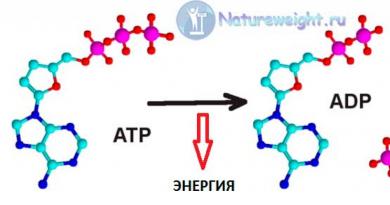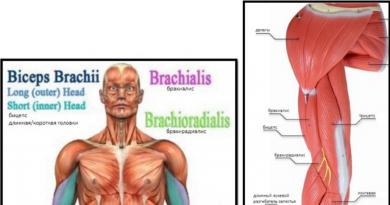Vegetable oils | ||
Oils high in omega-3 fatty acids |
||
Hemp | ||
Cedar | ||
walnut | ||
Oils with little or no omega-3 fatty acids |
||
Rapeseed | ||
Sunflower | ||
olive | ||
corn | ||
Pumpkin | ||
Peanut | ||
Cotton | ||
Sesame | ||
Not essential, but the unsaturated fatty acid oleic ( omega 9), the champion in the content of which is olive oil. Some vegetable oils also contain saturated fatty acids (palm and coconut, for example, and it is precisely the tropical origin of these plants that “allows” such acids to exist in their composition, which, as you already know, easily harden at low temperatures).
However, we repeat again and again - only a balanced diet, including all the main types of fatty acids, without "biases" in one direction or another can be considered optimal.
Vitamins, which are part of vegetable oils, also make a significant contribution to ensuring the normal functioning of the human body.
The most important of them are tocopherols(a mixture of fat-soluble vitamins of group E) - the famous antioxidant. In addition to protecting cells from free radicals, it supports our immunity, prevents thrombosis, participates in the synthesis of hormones and heme, positively affects the function of the gonads and muscle activity, promotes the absorption of fats, vitamins A and D.
For the normal functioning of the body at the cellular level the need for tocopherols is about 12 mg / day. Champions in their total content are wheat germ oils, cottonseed, soybean, sunflower. But here it is important to know that not all forms of tocopherols are equivalent in their biological effect. For example, in walnut seed oil and wheat germ oil, there are enough such forms, unlike, say, sunflower oil, where they are few (only 8%). Moreover, the need for vitamin E is directly proportional to the intake of polyunsaturated fatty acids in the body.
Total amount, mg/100 g | α-tocopherol | β-tocopherol | γ-tocopherol |
|
Cedar | ||||
Sunflower | ||||
Peanut | ||||
mustard | ||||
Sesame | ||||
olive |
Vitamin A in vegetable oils it is contained in the form of provitamins (carotenoids), which, although they themselves play the role of antioxidants, must still be converted into the final product during oxidative cleavage in the liver. It is essential for proper embryonic development, normal functioning of the immune system, good vision and bone growth, healthy skin and hair, prevention of heart and arterial disease, and helps maintain a constant blood sugar level. Red carrots and peppers contain a lot of carotenoids, as well as parsley and spinach (about 10 mg per 100 g of product).
Vitamin K1(phylloquinone) is also mainly obtained by humans from plant foods (champions in its content are green kale, spinach and broccoli). The main function of vitamin K is to ensure normal blood clotting, for which it is often called the "coagulation vitamin". It also plays an important role in the formation and restoration of the skeletal system, providing the synthesis of the osteocalcin protein necessary for calcium crystallization; participates in the regulation of redox processes in the body, in the construction of heart and lung tissues, in the normalization of the energy supply of the body, in the neutralization and elimination of certain toxins, in the healthy functioning of the kidneys and muscles, in the regulation of blood sugar.
Vitamin D(nuts, potatoes, some mushrooms) ensures the absorption of calcium and phosphorus from food in the intestines, which contributes to the normal growth and development of bones, teeth, nails. It is also necessary for the functioning of the thyroid gland and normal blood clotting, participates in metabolic processes, in the regulation of blood pressure, excitability of nerve cells and cell reproduction (including limits the growth of cancer cells), improves immunity. Interesting and unusual for vitamins is its effect on the stimulation of the synthesis of a number of hormones. It also removes lead and some other heavy metals from the body.
B vitamins(sunflower seed, buckwheat, rice, cashews, pine nuts, oatmeal, bran) are involved in the metabolism of carbohydrates, proteins and fats; provide normal growth; increase the motor and secretory activity of the stomach; normalize the work of the heart.
Vitamin PP in the form of nicotinic acid from plant sources plays a significant role in the redox processes of the body, in the growth of tissues and the normalization of fat metabolism. It is also involved in the conversion of fats and sugar into energy, reduces the level of "bad" cholesterol in the blood. There is a lot of it in grain coffee, mushrooms, buckwheat, wheat bread.
Vitamin F is necessary for the body for the normal functioning of the mucous membrane of the gastrointestinal tract, the state of the vessels, and the optimization of the liver. The best natural sources of it are: vegetable oils from the ovary of wheat, flaxseed, sunflower, safflower, soybeans, peanuts; almonds, avocados, oatmeal, corn, brown rice, nuts. For example, 12 teaspoons of sunflower seeds or can cover the daily requirement for a vitamin.
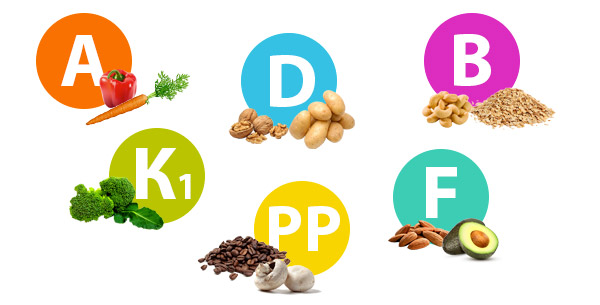
Vegetable fat also contains phytosterols And phospholipids(phosphatides) - substances that do not belong to irreplaceable nutritional factors (as they are able to be synthesized in the body), but play a significant role in many processes.
So, sterols of plant origin(sitosterol, ergosterol, stigmasterol and others) have an important ability to form insoluble complexes with cholesterol, which prevents its absorption in the small intestine and, accordingly, reduces its level in the blood. In addition, some of them are able to be included in the composition of cell membranes, and may also have estrogenic, antitumor, antifungal and bacteriostatic activity.
Phospholipids in the human body, they take part in the regulation of metabolism (especially active in lipid metabolism, contributing to the digestion and transport of fats), in the construction of membranes of all cells of the human body, nervous tissue, liver and brain cells.
The most significant and well-known of them are lecithins (phosphatidylcholines), whose most important functions are the normalization of the content of "bad" cholesterol (prevention of atherosclerosis and related cardiovascular diseases) and the promotion of protein accumulation.
Phospholipid deficiency in the diet leads to the accumulation of fat in the liver(in advanced cases, obesity and cirrhosis), an increased risk of a number of the above-mentioned diseases.
In addition, the biological value, absorption and effectiveness of vegetable oils also depend on the content of other phytochemical compounds in them that perform various functions in the body: minerals, proteins and free amino acids, pigments, waxes, essential oils and others.
For example, minerals in organic form that are part of vegetable oils (Mg, Fe, Ca, Zn, F, Se, Cu, Mn and many others) are involved in building bone tissue, regulating water-salt and acid-base balance, in the composition of enzyme systems, prevent the occurrence of a wide variety of diseases from diabetes to oncology. Pigments (represented mainly by chlorophylls and carotenoids) enhance metabolism in the body, stimulate tissue regeneration, and have bactericidal properties. Free amino acids in vegetable oils (mainly in the form of nitrogenous compounds) in the animal body are used for the synthesis of proteins, hormones and non-protein substances that perform special functions (choline, taurine, heme).
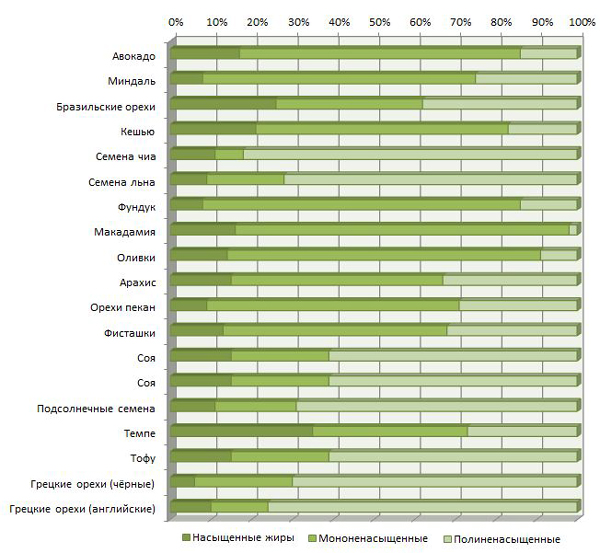
In human nutrition, various liquid oils are the source of vegetable fats: from the most common in our latitude sunflower or rare camelina to the sensational palm and olive. Currently, five to ten types of healthy edible vegetable oils can be easily found on store shelves at once. In cooking, they are used for dressing salads and frying foods, in baking and confectionery.
So, how and in what quantity these oils should be used correctly? We will talk about each of them in detail in separate articles, while it is worth learning the rules common to all vegetable fats.
Vegetable oils are produced for the most part by pressing or extracting from seeds and fruits of oilseed crops: sunflower, corn, soybean, rapeseed, pumpkin, cotton ) and soft tissue oils such as avocado pulp or coconut copra.
Pressing can be hot or cold, and filtration, refining (alkali exposure) and deodorization (odor removal) are used to further refine the oil. The oil obtained by extraction with special solvents is suitable for food only in a refined form.
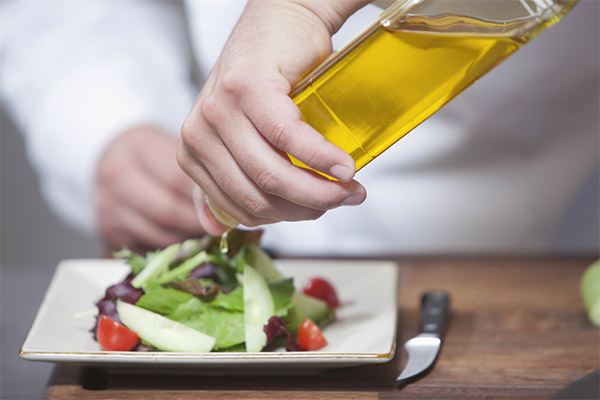
All vegetable oils, in order to preserve their beneficial properties, must be "live" - cold pressed / pressed (preferably the first), unfiltered and not deodorized. During their heat treatment, especially intensive, as well as canning and refining, a huge amount of useful fatty acids, vitamins and phospholipids is lost and destroyed - that is, the biological benefit goes away, only calories, energy value remain, plus harmful oxidation products accumulate.
That is, in its pure form, it is much more useful to use unprocessed oils. However, unrefined oil is not suitable for frying., since the particles of mucous and protein substances remaining in it, when the fat is heated to a high temperature, quickly decompose and can give the fried product a taste of bitterness and a specific unpleasant "steamy" smell. Fats that are heated many times are especially harmful.- they are actively formed carcinogens.
At what temperature do healthy oils become unhealthy?
Oil | Smoke point (°C) | What can be used for |
Linseed oil | Salads, sauces and dressings for ready meals |
|
walnut oil | ||
Unrefined sunflower, corn, peanut, sesame oils | Salads, sauces and dressings for ready meals, stewing, sautéing, light frying at a low temperature |
|
Olive unrefined | 177-204 |
|
Refined oils - rapeseed, walnut, sesame | ||
Refined oils - sunflower, corn, peanut, vegetable (soy) | Salads, sauces, oven baked goods, frying, deep frying |
|
Olive refined | 238-242 |
As for the choice and storage, oil bottled in dark glass and with a short shelf life will definitely be more natural and healthy than oil without color and odor, without any signs of raw materials and with an infinite shelf life. Think for yourself how deep technological processing (and therefore unprofitable changes) such a product is subjected to and what it can do in your body.

We have already discussed trans fats in detail in the topic of animal fats. For vegetable oils, the message is the same: vegetable fats solidified by hydrogenation are the most dangerous to your health. These are margarines, spreads, mayonnaise and soft butter mixtures. Technological irregularities in refining can also lead to the formation of "wrong" oils. The "broken" molecular structures in their composition - trans-fatty acids - are the cause of an increased risk of a number of dangerous diseases, from diabetes and obesity to atherosclerosis and cancer. By the way, some raw vegetable fats, namely coconut and palm oils, also contain trans isomers. In addition to the above foods, trans fats (as well as a lot of hidden fat, which you can completely miss in calculating the calorie content of the diet) are abundant in fast food, confectionery and convenience foods.


